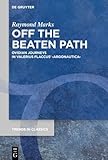Off the Beaten Path : Ovidian Journeys in Valerius Flaccus’ ›Argonautica‹ / Raymond Marks.
Material type: TextSeries: Trends in Classics - Supplementary Volumes ; 161Publisher: Berlin ; Boston : De Gruyter, [2024]Copyright date: 2024Description: 1 online resource (XV, 233 p.)Content type:
TextSeries: Trends in Classics - Supplementary Volumes ; 161Publisher: Berlin ; Boston : De Gruyter, [2024]Copyright date: 2024Description: 1 online resource (XV, 233 p.)Content type: - 9783111403045
- 9783111403892
- 9783111403649
- 873/.01 23/eng/20240703
- PA6791.V5 M37 2024
- online - DeGruyter
- Issued also in print.
| Item type | Current library | Call number | URL | Status | Notes | Barcode | |
|---|---|---|---|---|---|---|---|
 eBook
eBook
|
Biblioteca "Angelicum" Pont. Univ. S.Tommaso d'Aquino Nuvola online | online - DeGruyter (Browse shelf(Opens below)) | Online access | Not for loan (Accesso limitato) | Accesso per gli utenti autorizzati / Access for authorized users | (dgr)9783111403649 |
Frontmatter -- Acknowledgments -- Contents -- Introduction -- 1 The Proem -- 2 The Vehicle -- 3 The Path -- 4 Io -- 5 The Temple of the Sun -- 6 The Final Cut -- 7 Epilogue: The Metamorphoses and the End -- Bibliography -- Index Locorum -- Index Nominum
restricted access online access with authorization star
http://purl.org/coar/access_right/c_16ec
In the Argonautica, Valerius Flaccus not only recounts a voyage, that of the Argonauts in their quest for the golden fleece, but takes a journey himself, a poetic one, during which he explores new, unconventional paths in the epic genre. The present volume examines this aspect of Valerius’ poetic program, locating its primary source of inspiration in the works of Ovid, especially his epic, the Metamorphoses, and his exile poetry. It argues that the Metamorphoses influences not only discrete – often digressive – episodes in the Argonautica, but Valerius’ view of his poem as a “secondary” form of epic, which broadly deviates from the generic norms of his day. Echoes of the Tristia and Epistulae ex Ponto complement this approach by identifying many of Valerius’ characters, who are similarly displaced to the edges of the civilized world, with the exiled Ovid and even Valerius himself, who, at the end of the epic, finds his own “ship”, the epic itself, stranded roughly where Ovid lived out his days in exile. From this study, readers will gain a greater appreciation for the importance of Ovid to Valerius’ conception and execution of his epic program and one of its central themes, the journey.
Issued also in print.
Mode of access: Internet via World Wide Web.
In English.
Description based on online resource; title from PDF title page (publisher's Web site, viewed 20. Nov 2024)


